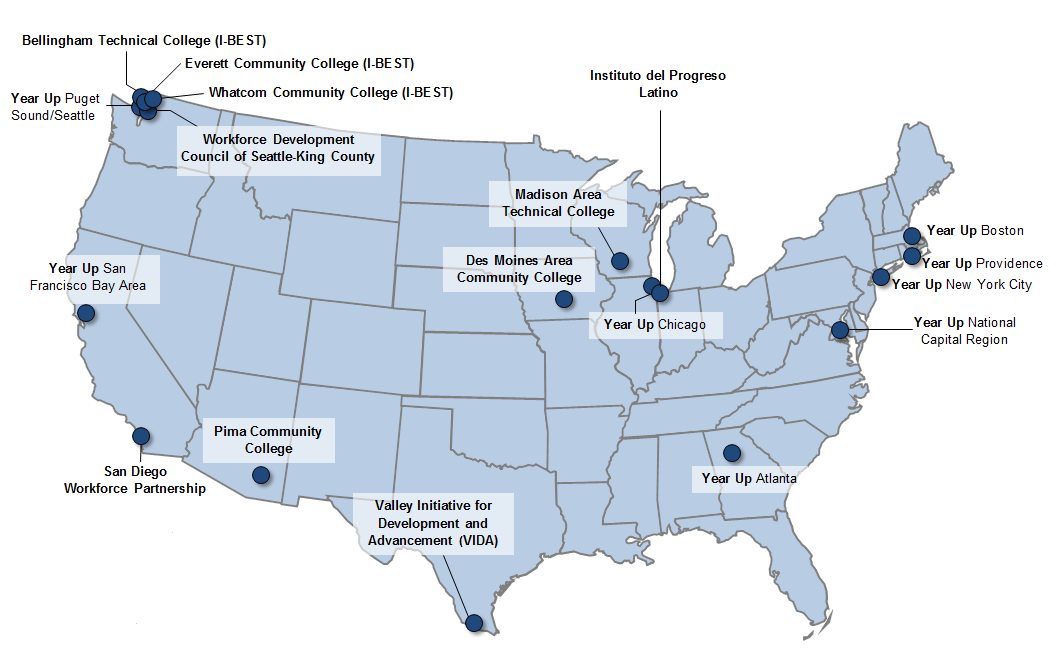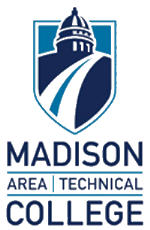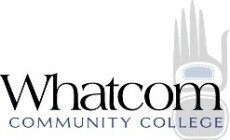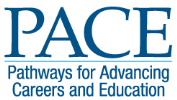The PACE team is working with community colleges, community organizations, and state agencies across the country to test innovative career pathways programs. The nine PACE Partner Sites are: Carreras en Salud: Instituto del Progreso Latino, Des Moines Area Community College, Madison Area Technical College, Pima Community College, San Diego Workforce Partnership, Valley Initiative for Development and Advancement, Washington I-BEST program in Bellingham Technical College, Everett Community College, and Whatcom Community College, Workforce Development Council of Seattle-King County, and Year Up.

 |
Carreras en Salud: Instituto del Progreso Latino – Chicago, IllinoisInstituto del Progreso Latino is a large non-profit education and employment organization in Chicago, established in 1977 to serve the city’s growing Latino population. Over 14,000 individuals and families are served each year through a variety of programs operated by Instituto del Progreso Latino, often in partnership with other community organizations and institutions. Launched in 2005, Carreras en Salud (Careers in Health) is a career pathway program in nursing occupations for low-skilled and limited English proficient Latinos that leads participants from a Certified Nursing Assistant (CNA) degree to Pre-Licensed Practitioner Nurse (LPN) to LPN and ultimately to Registered Nurse (RN). Instituto del Progreso Latino, in partnership with National Council of La Raza (NCLR), Humboldt Park Vocational and Education Center of Wilbur Wright College, and Association House, designed Carreras en Salud to address both the academic and non-academic needs of low-skilled Latinos. The training program provides a pre-college contextualized curriculum that moves students along an academic, career, and social ladder towards higher paying jobs and greater community involvement. |
 |
Des Moines Area Community College – Des Moines, IowaDMACC’s Community and Workforce Partnership (CWP) division was established in 2000 to expand access to DMACC for underserved populations in the community. One of CWP’s major programs is the Workforce Training Academy (WTA), which offers low-income students the opportunity to enroll in short-term occupational training certificate courses in occupations determined by the state workforce department to be in high demand, and allows students to move directly into one-year diploma and two-year associate’s degree programs. In addition to occupational training, WTA offers pre-employment classes including life skills, financial literacy, and supported access to GED and ESL instruction. With a combination of funding sources, including WIA and state economic development funds, tuition is free for qualifying students. For PACE, DMACC is offering a new program in WTA—the Prepared Learner Program—for those who do not score high enough on the CASAS test to enter the standard WTA training. Students in the Prepared Learner Program receive contextualized basic skills instruction, instruction in employment and life skills, and vocational training through a short-term certificate course. Each short-term certificate offered in the Prepared Learner Program ladders into one or more specific certificate, degree, or diploma programs at WTA, and upon completion of the Prepared Learner Program, treatment group members are able to qualify directly into these programs. Participants receive wrap-around services in the form of intrusive advising from an Achievement Coach, transportation support, and financial literacy training and benefits acquisition assistance from DMACC’s partner—Iowans for Social and Economic Development (ISED). DMACC currently offers and delivers all the services they plan to include in the Prepared Learner Program, but for PACE they will implement a structured program of components specifically for the target population they have identified—low-income, hard-to-serve individuals who are unable to begin on a career pathway because of low test scores. |
 |
Madison Area Technical College – Madison, WisconsinMadison Area Technical College’s (MATC) Patient Care Pathway Program provides short-term condensed training that allows lower-skilled students to take courses for college credit and prepare them for health care degree and diploma programs. The program operates out of the School of Online and Accelerated Learning. There are two tracks offered in the program depending on the student’s skill level – Patient Care 1 (PCA 1) and Patient Care 2 (PCA 2) – both of which ladder into several established academic programs in the health field. PCA 1 is for students interested in a one-year health Diploma Program or a two-year health Degree Program with placement test scores too low for PCA 2. PCA 2 is designed for students interested in pursuing a two-year health Associates Degree. Through the program, students who come to the College with academic skills that are too low to begin their health program right away are able to accelerate their remediation process and persist toward their degree more quickly. Both Patient Care Academies integrate developmental coursework with health program prerequisites and contextualize the developmental courses for the health field. Students in the Patient Care Academies take classes in a cohort so that they form bonds and study groups with one another. The Patient Care Pathway Program also provides intrusive advising. The goal of the program is to engage and retain students who otherwise may have been discouraged from pursing a postsecondary degree or diploma. |
 |
Pima Community College – Tucson, ArizonaThe Pathways to Healthcare Program works closely with One Stop centers to recruit students, offering students training in sixteen different healthcare professions based on personal preference and test scores. Trainings range from home health aides to medical billers/coders, to EMT-Paramedics. The length of training can be as short as the five-week Nursing Assistant training, or up to two or three years for any of the associate degree programs (Clinical Research Coordinator, Health information Technology and Pharmacy Technology). Once enrolled in the Pathways program, students have access to a variety of supportive services including case management, remedial or developmental education if needed before beginning occupational training, a dedicated Pathways advisor, and a dedicated Pathways One-Stop Center case manager who works with them to find employment upon completion of the training program. Pathways staff support students to train to their highest earning potential by completing training and a securing a job, then supporting them through more Pathways training and ultimately a well-paying career. For example, a student first may earn a Nursing Assistant certificate, get a job in that field, and then return to Pathways to earn a Practical Nursing degree. |
 |
San Diego Workforce Partnership – San Diego, CaliforniaSan Diego Workforce Partnership (Workforce Partnership), San Diego’s Workforce Investment Board, funds job training programs that enable eligible adults to develop the skills and knowledge needed for emerging career opportunities within such fields as green jobs, healthcare, and clean technology. In 2010, Workforce Partnership received a Health Profession Opportunity Grant (HPOG) from the U.S. Department of Health and Human Services to operate the Bridge to Employment in the Healthcare Industry program. Workforce Partnership subcontracts with three community-based partners, referred to as “navigators,” to provide services in San Diego County: MAAC Project, Comprehensive Training Systems (CTS), and North County Lifeline. MAAC Project also subcontracts for these services with International Rescue Committee (IRC). In addition to the navigators, the Workforce Partnership contracts with University of California San Diego Student Run Free Medical Clinic Project for work experience opportunities. The program uses an individual training account (ITA) model to help participants pay for training programs, combined with extensive case management and support services. The navigators also guide participants in selecting a training program, although, ultimately, the participants choose the program. The goals of the program are to help participants complete training, gain certification, and find employment in the healthcare field in which they were trained. |
 |
Valley Initiative for Development and Advancement (VIDA) – South TexasServing four large counties in southern Texas, the non-profit Valley Initiative for Development and Advancement (VIDA) aims to help students achieve an Associate’s degree and gain occupational training in allied health, manufacturing, technology, business, education, and other specialized trades. VIDA offers a bridge program, the College Prep Academy, to build basic educational and language skills in preparation for enrollment at a local community college. The program also provides support services. Modeled after Project QUEST in San Antonio, VIDA requires a strong commitment to full-time education both on the part of the individual and the program. |
   |
Washington I-BESTImplemented in 2004, the Integrated Basic Education and Skills Training (I-BEST) program operates in all 34 of Washington’s community and technical colleges and currently serves over 2,000 students statewide. I-BEST is a multi-occupation program that concurrently provides basic skills or English as a Second Language (ESL) instruction and training in a range of credit-based occupational training programs along with counseling and other supports. Bellingham Technical College – Bellingham, WashingtonBellingham Technical College (BTC) offers over 50 associate degree and certificate programs to serve students with a wide array of educational experiences and goals. The college places a strong emphasis on providing students with the educational opportunities to succeed in the local labor market. BTC is committed to providing supports and educational offerings for individuals with limited English skills or low basic skills. BTC has used I-BEST to expand educational and training opportunities for students with low basic skills. With a strong emphasis on matching course offerings to local labor market conditions, BTC currently offers I-BEST versions of four programs: Nursing Assistant, Automotive Technology, Welding, and Electrical Foundations. In each case, I-BEST supports students in pursuit of a marketable certification as well as the opportunity to pursue a two-year degree. Everett Community College – Everett, WashingtonEverett Community College (EvCC) is a comprehensive, two-year community college serving over 20,000 students per year. EvCC is located in the heart of Boeing country, within ten miles of Boeing’s largest manufacturing plant. EvCC offers over 100 professional, academic, technical degrees and certificate programs, as well as Adult Basic Education (ABE), English as a Second Language (ESL), GED and community education classes. EvCC’s I-BEST focus is on three programs: Nursing Assistant Certified (NAC), Sustainable Office Skills (SOS) and Welding. In all three I-BEST programs, ABE instructors and professional-technical instructors provide students with literacy education and workforce skills at the same time. Whatcom Community College – Bellingham, WashingtonWhatcom Community College (WCC) is a comprehensive two-year college serving over 7,000 students quarterly and more than 12,000 annually. Whatcom offers transfer degrees and professional training programs, as well as basic education and community education classes. WCC offers many degrees, certificates and endorsements in a number of professional technical fields of study. The programs are geared towards workforce education. General program areas include: Healthcare, Business, Technology & Design, Education and Law & Justice. WCC has used I-BEST to expand educational and training opportunities for students with low basic skills. In addition, it serves as an entry point to more advanced training and transfer opportunities. |
 |
Workforce Development Council of Seattle-King County – Seattle, WashingtonHealth Careers for All (HCA), operating across Seattle-King County, Washington, is designed to meet the region’s expanding healthcare labor needs while simultaneously addressing the training, employment, and advancement needs of its low-income residents. HCA participants receive career exploration and planning, integrated case management, wrap-around support services and systems-navigation assistance through grant-funded navigators. Training is offered within three tiers – foundational, entry level, and more advanced – providing multiple entry and exit points for participants to access employment in the healthcare field and advance in their careers over time. Instruction at the foundational level integrates introductory healthcare content with basic academic skills. Entry-level training incorporates nationally recognized instructional best practices proven to make a difference with the target population (including “I-BEST”), preparing participants for jobs such as Nursing Assistant, Medical Office, and Phlebotomist. More advanced training is customized to help participants reach and complete “next-step” programs including Medical Assisting and Nursing. Navigators funded under the grant are a vehicle for integrating resources across education, workforce, and social service systems for each participant. The HCA grant is managed by the Workforce Development Council of Seattle-King County (WDC). The WDC is a nonprofit workforce “think tank” and grant-making organization whose mission is to support a strong economy and ensure the ability of each person to achieve self-sufficiency. Established in 2000 by the King County Executive and the Mayor of Seattle, the WDC is led by a board of directors with a private-sector majority. It oversees a wide range of employment-related programs and initiatives, serving thousands of King County youth, adults and businesses each year. |
 |
Year UpFounded in 2000, Year Up believes that a well-designed training and support program can make an incredible difference in young peoples’ lives. Our mission is to close the Opportunity Divide by providing urban young adults with the skills, experience and support that will empower them to reach their potential through professional careers and higher education. Our intensive one-year program provides high school graduates and GED recipients between the ages of 18-24 with a combination of hands-on skill development and corporate internship opportunities. The first six months of the program focuses on technical and professional skill building, while the second six months focuses on applying these skills through corporate internships. Students also earn up to 18 college credits. In 2013, Year Up will serve nearly 2,000 students within 9 sites located in Atlanta, Baltimore, Bay Area, Boston, Chicago, National Capital Region, New York City, Providence and Puget Sound. Year Up’s high-expectation, high-support program combines marketable job skills, stipends, corporate internships and college credits. We address students’ social and emotional development and provide appropriate support to place these young adults on a viable path to economic self-sufficiency. During the first six months, students attend classes at Year Up, learning technical and professional skills that prepare them for success in a corporate environment. During the second six months, Year Up students gain experience in internships at leading companies such as State Street Corporation and Partners HealthCare. After graduation, students continue to receive support and build their professional networks through Year Up’s Alumni Association which currently numbers close to 3,500. Over the next few years, Year Up will create a network of sites with an explicit goal of serving more than 2,500 urban young adults by 2016. Ultimately, Year Up’s goal is to create and implement a scalable model that will enable us to effectively serve tens of thousands of urban young adults across the country. |

